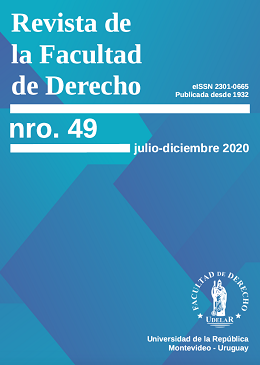O Tribunal Internacional de Justiça no processo Jadhav (Índia v. Paquistão) e um acoplamento normativo demorado:
direito a ser informado da assistência consular e dos direitos humanos
DOI:
https://doi.org/10.22187/rfd2020n49a16Palavras-chave:
Direito de ser informado à assistência consular, Tribunal Internacional de Justiça, Convenção de Viena sobre Relações Consulares, Direitos do Homem, Tribunal Interamericano dos Direitos do HomemResumo
Este artigo analisa criticamente a jurisprudência do Tribunal Internacional de Justiça em relação à interpretação e aplicação do artigo 36º da Convenção de Viena sobre Relações Consulares. Desta vez, segue-se a recente decisão no processo Jadhav (Índia contra Paquistão), no qual o Tribunal mantém uma linha de jurisprudência que é analisada nas suas limitações em relação aos direitos humanos, e que tem antecedentes.Pretende-se demonstrar, através da análise normativa e jurisprudencial como método essencial do trabalho, que ainda não se registaram progressos decisivos no reconhecimento do direito a ser informado da assistência consultar como um direito humano que disponha de autonomia no plano jurídico. O Tribunal Internacional de Justiça não tira todas as consequências no domínio dos direitos humanos nesta matéria. Este trabalho teria a coragem de apontar as linhas que a jurisprudência do Tribunal deveria seguir para acolher a tendência a ocupar-se dos assuntos sobre direitos humanos.
Downloads
Referências
Andrés Sáenz de Santamaría, P. (2013). Una nueva contribución a la fijación de la indemnización por hecho internacionalmente ilícito: la Sentencia de la Corte Internacional de Justicia de 19 de Junio de 2012 en el asunto Ahmadou Sadio Diallo. En S. Torres Bernárdez (coord.), El derecho internacional en el mundo multipolar del siglo XXI: obra homenaje al profesor Luis Ignacio Sánchez Rodríguez, pp. 203-218.
Bedi, S. (2007). The Development of Human Rights Law by the Judges of the International Court of Justice. Oregon: Oxford-Portland.
Bruno Simma, B. (2012). Human Rights Before the International Court of Justice: Community Interest Coming to Life? En: Holger Hestermeyer [et al.], Coexistence, cooperation and solidarity: liber amicorum Rüdiger Wolfrum. Leiden/Boston: Martinus Nijhoff Publishers, 577-604.
Cançado Trindade,A. A. (2013). El difícil camino del acceso de la persona humana a la justicia en el contencioso interestatal ante la Corte Internacional de Justicia. AHLADI, (21), 173-213.
Cançado Trindade. A. A. (2003). International Law for Humankind Towards a New Jus Gentium. Leiden/Boston: Martinus Nijhoff Publishers.
Crawford, J., y Keene, A. (2019). Interpretation of the human rights treaties by the International Court of Justice. The International Journal of Human Rights. https://doi.org/10.1080/13642987.2019.1600509
Deen-Racsmány, Z. (2002). Diplomatic Protection and the LaGrand Case. Leiden Journal of International Law, (15), 87-103.
Díaz Barrado, C. M. (2004). El Derecho Internacional del Tiempo Presente. Madrid: Dykinson.
Dubey, A. (2017). The Jadhav Case Before the International Court of Justice. Indian Journal of International Law, 57, 357–384. https://doi.org/10.1007/s40901-017-0067-2
Giorgetti, C. (2008). Introductory note to international court of Justice: Request for Interpretation of the Judgment in the case concerning Avena and other Mexican nationals. International Legal Materials, 5(47), 723-725.
Higgins, R. (2007). Human Rights in the International Court of Justice. Leiden Journal of International Law, (20), 745–751.
Jenning, R. (2002). The Lagrand Case. The Law and Practice of International Courts and Tribunals (1), 13–54.
Kammerhofer, J. (2003). The Binding Nature of Provisional Measures of the International Court of Justice: the ‘Settlement’ of the Issue in the LaGrand Case. Leiden Journal of International Law, (16), 67-83.
Mennecke, M., y Tams, C. J. (2002). Lagrand Case (Germany v United States of America). The International and Comparative Law Quarterly, 2(51), 449-455.
Meron, T. (2006). The Humanization of International Law, General Courseon Public International Law, Hague Academy of International Law. Martinus Leiden-Boston, Nijhoff Publishers.
Orakhelashvili, A. (2002). Questions of International Judicial Jurisdiction in the LaGrand Case. Leiden Journal of International Law, (15), 105-130.
Orakhelashvili, A. (2005). Judicial Competence and Judicial Remedies in the Avena Case. Leiden Journal of International Law, 18, 31-48.
Pastor Palomar, A. (2010). La protección diplomática mediante la Corte Internacional de Justicia a favor del Sr. Diallo, empresario de la República de Guinea en la República Democrática del Congo. Sentencia de la CIJ de 24 de mayo de 2007. Asunto “Ahmadou Sadio Diallo” (República de Guinea c. República Democrática del Congo). En: L. I. Sánchez Rodríguez [et. al], El poder de los jueces y el estado actual del derecho internacional: análisis crítico de la jurisprudencia internacional (2000-2007), pp. 589- 604.
Petit De Gabriel, E.W., (2017). Los “derechos consulares” de los extranjeros
detenidos: ¿Nuevas cartas en la baraja de los derechos fundamentales? Revista Electrónica de Estudios Internacionales, 33. https://doi.org/10.17103/reei.33.07
Polak, M. J. (2017). The Jadhav case and the right to consular assistance: ‘confessions’ , spies, and remedies in international law. Indian Journal of International Law, 57, 385–409. https://doi.org/10.1007/s40901-018-0077-8
Pulkowski, D. (2006). Testing Compliance Theories: Towards US Obedience of International Law in the Avena Case. Leiden Journal of International Law, (19), 511-554.
Shelton, D. L. (2004). Case concerning Avena and Other Mexican Nationals (Mexico v. United States). The American Journal of International Law, (98), 3, 2004, 559-566.
Sreenivasa Rao, P. (2016). The Jadhav case (2017): India and Pakistan before the International Court of Justice. Indian Journal of International Law, 56,379–403. https://doi.org/10.1007/s40901-017-0063-6
Villegas Delgado, C. (2020). La Corte Internacional de Justicia y la paulatina humanización del Derecho consular: de Breard a Jadhav. Revista Electrónica de Estudios Internacionales, 39. https://doi.org/10.17103/reei.39.04
Publicado
Como Citar
Edição
Seção
Licença
Revista de la Facultad de Derecho. Creative Commons Reconocimiento 4.0 Internacional License.


